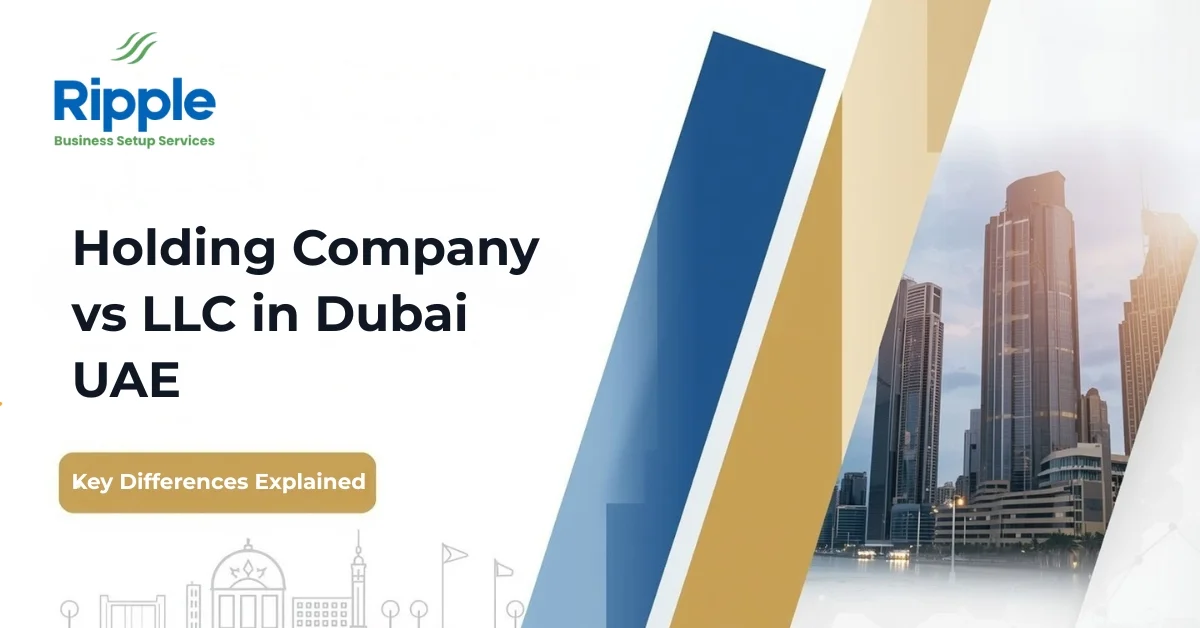Dubai is one of the most attractive destinations for entrepreneurs looking to expand their business internationally. The city offers a stable economy, a favorable tax system, and easy access to regional and global markets. However, before starting a business in Dubai, it’s crucial to choose the right legal structure.
Among the most popular business setups are the Holding Company and the Limited Liability Company (LLC). Each has its own advantages, requirements, and limitations. Understanding the key differences between a holding company and an LLC in Dubai helps investors make smart, long-term decisions.
What Is a Holding Company in Dubai?
A holding company in Dubai is a type of business entity that owns shares or assets in other companies. Its main role is not to carry out day-to-day operations but to control, manage, and oversee the companies it owns.
Holding companies are often used by investors and corporate groups to manage multiple subsidiaries under one umbrella. This structure provides a clear organizational hierarchy and financial control.
1. Primary Purpose and Structure
The primary goal of a holding company is asset protection and strategic management. It usually owns shares in one or more operating companies. These subsidiaries handle daily operations, while the holding company manages investment decisions and governance.
In Dubai, a holding company can be set up either in the mainland or a free zone, depending on the owner’s business needs. Many free zones, such as DMCC, DIFC, and JAFZA, allow the registration of holding companies.
2. Activities a Holding Company Can and Cannot Perform
A holding company cannot engage in trading or production. Its permitted activities include:
- Owning shares in other companies
- Managing and supervising subsidiary businesses
- Holding real estate and intellectual property
- Providing financial or strategic support to subsidiaries
However, it cannot perform activities like selling products, offering services to the public, or engaging in direct commercial operations.
What Is an LLC in Dubai?
An LLC (Limited Liability Company) is the most common business structure in Dubai for local and foreign entrepreneurs. It allows full commercial activity and operational flexibility.
An LLC is a separate legal entity where the liability of each shareholder is limited to their share capital. This means personal assets are protected from company debts.
1. Ownership Structure and Liability
Under the current UAE company laws, a Dubai LLC can be 100% foreign-owned in most business activities (except for a few restricted sectors). An LLC requires at least one shareholder and can have up to 50 shareholders.
The liability of each shareholder is limited to the amount of capital they invest. This makes it a safer option for individuals and corporations who want to operate a trading, industrial, or service-based company.
2. Activities and Operational Scope
Unlike holding companies, LLCs can engage in commercial, industrial, or professional activities. Common LLC business types include:
- Trading and import/export
- Real estate and construction
- Consulting and professional services
- Manufacturing and contracting
LLCs can also hire employees, lease offices, and engage in day-to-day business operations across the UAE and internationally.
Main Differences Between Holding Company and LLC
While both entities are legal and profitable structures in Dubai, they serve different purposes. Let’s break down their main differences.
1. Legal Formation and Ownership
A holding company is primarily an investment entity formed to manage subsidiaries. An LLC, on the other hand, is a trading or operating company formed to perform business activities.
Ownership in a holding company often involves corporate shareholders, while an LLC can have individual or corporate owners.
2. Management and Control
A holding company manages multiple subsidiaries and has strategic control. LLCs have direct operational control and are managed by appointed directors or managers.
3. Operational Flexibility
LLCs enjoy full flexibility in day-to-day business operations, while holding companies are restricted from trading or offering services directly.
4. Tax Implications
Both structures benefit from Dubai’s low-tax environment, but their taxation differs:
- Holding companies mainly earn dividends, capital gains, or investment income, which are often tax-exempt under UAE corporate tax rules.
- LLCs are subject to 9% corporate tax on profits exceeding AED 375,000, except those registered in tax-free zones with exemptions.
5. Licensing and Compliance
Holding companies require fewer operational licenses, while LLCs must obtain specific business activity licenses from the Department of Economy and Tourism (DET) or free zone authorities.
6. Profit Distribution and Liabilities
In a holding company, profits are distributed from subsidiaries to the parent. In an LLC, profits are shared among shareholders based on the ownership percentage. Both entities limit shareholder liability to their invested capital.
Business Activities Allowed
1. Activities Under a Holding Company License
- Owning shares in subsidiaries
- Managing group assets
- Holding real estate or trademarks
- Overseeing investment portfolios
2. Activities Under an LLC License
- Trading and import/export
- Service provision
- Manufacturing and contracting
- Real estate development and property management
3. Restrictions and Regulatory Requirements
Holding companies cannot perform commercial or customer-facing activities. LLCs, however, must follow commercial regulations, annual audits, and VAT registration if applicable.
Ownership and Shareholding Structure
1. UAE and Foreign Ownership Rules
Following the 2021 UAE company law amendments, foreign investors can now own 100% of an LLC in most sectors. Holding companies also allow 100% foreign ownership in free zones.
2. Shareholder Rights and Responsibilities
In both entities, shareholders have voting rights, profit-sharing entitlements, and decision-making authority based on their shares.
3. Role of Parent vs Subsidiary Companies
In a holding company structure, the parent company owns and controls subsidiaries. The subsidiaries operate independently but report to the parent for strategy and compliance. LLCs generally function as standalone entities without parent oversight unless they are part of a group.
Tax and Financial Considerations
1. Corporate Tax Applicability
Holding companies and LLCs are both subject to UAE Corporate Tax Law, but the impact differs.
- Holding companies may not be taxed on dividends or capital gains from subsidiaries if they meet participation exemption criteria.
- LLCs must pay corporate tax on taxable profits over AED 375,000.
2. Dividend Income and Capital Gains
Holding companies often benefit from tax-free dividend income and capital gains when selling shares in subsidiaries. This is a major reason why large business groups use holding company structures.
3. VAT and Accounting Compliance
LLCs involved in trading or services must register for VAT if their annual revenue exceeds AED 375,000. Holding companies, unless providing taxable services, usually don’t need VAT registration but must maintain proper financial statements and audits.
Setup Process and Cost Comparison
1. Steps to Register a Holding Company in Dubai
- Choose the right jurisdiction (mainland or free zone)
- Select the parent company structure
- Submit shareholder documents
- Obtain initial approval from authorities
- Register and obtain a trade license
2. Steps to Form an LLC in Dubai
- Select business activity and trade name
- Prepare Memorandum of Association (MOA)
- Get approvals from DET or the free zone authority
- Lease office space
- Obtain trade license and bank account
3. Setup Time and Cost Differences
Setting up a holding company is usually faster and cheaper, especially in free zones, since it involves minimal licensing.
An LLC setup can take longer and cost more due to operational requirements, tenancy contracts, and specific licenses.
Which Business Structure Is Right for You?
Choosing between a holding company and an LLC depends on your business goals and investment model.
1. When to Choose a Holding Company
- You want to manage multiple businesses under one entity
- Your goal is long-term investment and asset protection
- You prefer a structure for tax efficiency and control
2. When to Choose an LLC
- You plan to trade, sell products, or offer services in the UAE
- You want operational flexibility and direct business activity
- You need a license for specific commercial or professional work
3. Factors to Consider
- Business nature: trading or holding assets
- Ownership goals: single vs group management
- Tax exposure: type of income generated
- Risk level: operational or investment-based
Common Mistakes to Avoid
Many entrepreneurs make costly mistakes when setting up their business in Dubai. Common errors include:
- Choosing the wrong structure for their goals
- Ignoring tax and compliance obligations
- Misunderstanding ownership laws and local regulations
- Failing to consult professional advisors before setup
How Ripple Can Help
Setting up a business in Dubai can be complex without the right guidance. Ripple Business Services helps entrepreneurs and investors choose the right legal structure, whether it’s a Holding Company or an LLC.
Ripple’s team provides:
- Company formation support in the mainland and free zones
- Legal and tax advisory services
- Corporate structuring for holding entities
- End-to-end business setup, licensing, and compliance solutions
With Ripple, you can ensure your business is legally compliant, financially efficient, and strategically structured for growth in the UAE.
Conclusion
Both holding companies and LLCs play vital roles in Dubai’s business ecosystem. A holding company is ideal for managing assets, subsidiaries, and investments, while an LLC is perfect for trading, operational, and service-oriented businesses.
The right choice depends on your business goals, activity type, and ownership structure. By understanding the key differences between a holding company and an LLC, you can make a confident and informed decision.
Disclaimer: This article is for general informational purposes only and does not constitute legal or financial advice. Always consult a UAE business expert before making decisions.






